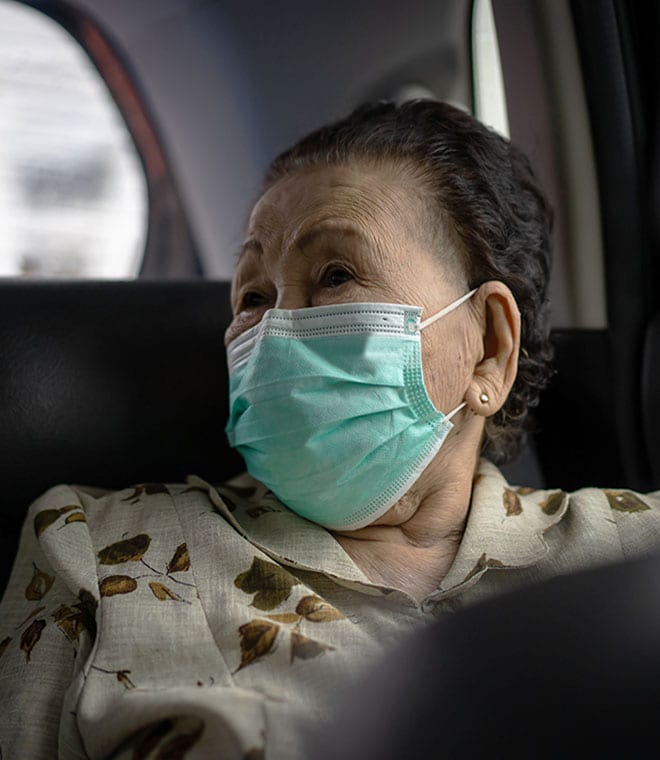Health
COVID-19: Relief for short- and long-term symptoms
By Loren M. Blinde, PhD Oct 21, 2025 • 6 min
COVID-19 is frustrating because of the wide variety of symptoms that may develop. Some people might not have any symptoms at all, while others have severe symptoms that can land them in the hospital. Even after recovery, some struggle for months with lingering post-COVID conditions (long COVID), which begs the question: What symptoms are related to COVID-19 and what can you do to ease them?
What are the symptoms of COVID-19?
People with COVID-19 can develop a variety of symptoms, and while most will be mild, they have the potential to become severe. Symptoms of COVID-19 may show up as early as two days after you’ve been exposed to the virus, but it can also take up to two weeks for symptoms to emerge.
Common symptoms of COVID-19 include:
- Fever or chills
- Cough
- Shortness of breath or trouble breathing
- Fatigue
- Muscle or body aches
- Headache
- New loss of taste or smell
- Sore throat
- Congestion or runny nose
- Nausea or vomiting
- Diarrhea
Certain symptoms could be emergency warning signs, and if experienced, you should seek immediate medical care. These symptoms may include:
- Trouble breathing
- Persistent pain or pressure in the chest
- New confusion
- Inability to wake or stay awake
- Pale, gray or blue-colored skin, lips or nail beds, depending on skin tone
Uh-oh, I have some of these symptoms. What should I do next?
If you have emergency warning signs, call 911 or go directly to the emergency department.
If you have common symptoms, especially if you know you were exposed to someone else with COVID-19, you should try to stay away from other people or wear a mask if you must go places to prevent spreading it to loved ones or other people in your community. Because symptoms of COVID-19 are often similar to other illnesses, you should contact your healthcare provider to help determine next steps. They may recommend that you test yourself or get tested for COVID-19. If the test comes back positive, then you can isolate yourself to protect loved ones and people you come into contact within your community. You can also gain faster access to treatments if you need them. Walgreens offers a variety of convenient COVID-19 testing options. Some combination testing products can test for both influenza and COVID-19.
Walgreens also offers a variety of over-the-counter medications to help with symptom relief, and our convenient pickup and delivery options make it easier to get these products. Before taking any medications, check with your pharmacist or healthcare provider. And check with your pediatrician before ordering or administering over-the-counter medications to children.
What is “long COVID" and how is it different from regular COVID-19?
A typical mild or moderate case of COVID-19 runs its course within two weeks, but some symptoms may linger for months. These symptoms, which can include fatigue, shortness of breath, and trouble with thinking and memory, among others, can make it difficult to participate in school, work or other daily activities. They can come and go and may get worse after doing something physically or mentally difficult. Together, these long-term effects may be diagnosed by a healthcare provider as post-COVID conditions or long COVID.
Symptoms of long COVID include:
- Fatigue
- Fever
- Shortness of breath
- Cough
- Chest pain
- A sensation of a fast heartbeat or pounding heart
- Trouble with thinking and memory, i.e., “brain fog”
- Headache
- Trouble sleeping
- Depression and anxiety
- Nerve symptoms (feeling of pins and needles)
- Changes in sense of taste or smell
- Diarrhea, stomach pain
- Joint pain, muscle pain
- Rashes
- Problems with menstrual cycles
Although anyone who has been infected with COVID-19 can get long COVID, research suggests that unvaccinated people with COVID-19 may be at higher risk of developing long COVID symptoms than vaccinated people with COVID-19. People can have long COVID symptoms no matter how sick they were with COVID-19 — even if they had no symptoms. If you’re eligible, getting vaccinated may help prevent long COVID.
If you’ve recovered after a COVID-19 infection but have lingering symptoms, talk with your healthcare provider about what you’re experiencing. Your provider can recommend treatments such as breathing exercises, physical therapy, stress management and medication to help with symptoms.
Researchers are working to understand more about why some people get long COVID and others don’t. In the meantime, the best way to avoid getting long COVID is to avoid getting infected with COVID-19 in the first place.
Clinically reviewed and updated by Julie McDaniel, MSN, RN, CRNI October 2025.
Sources:
- https://www.cdc.gov/covid/signs-symptoms/index.html
- https://www.cdc.gov/respiratory-viruses/prevention/index.html
- https://www.cdc.gov/respiratory-viruses/prevention/precautions-when-sick.html
- https://www.ama-assn.org/delivering-care/public-health/what-long-covid
- http://www.uptodate.com/contents/covid-19-evaluation-and-management-of-adults-with-persistent-symptoms-following-acute-illness-long-covid
- https://www.lung.org/lung-health-diseases/lung-disease-lookup/covid-19/covid-19-testing/if-you-test-covid-positive-steps
- https://www.cdc.gov/long-covid/about/index.html
- https://www.lung.org/lung-health-diseases/lung-disease-lookup/covid-19/long-covid

